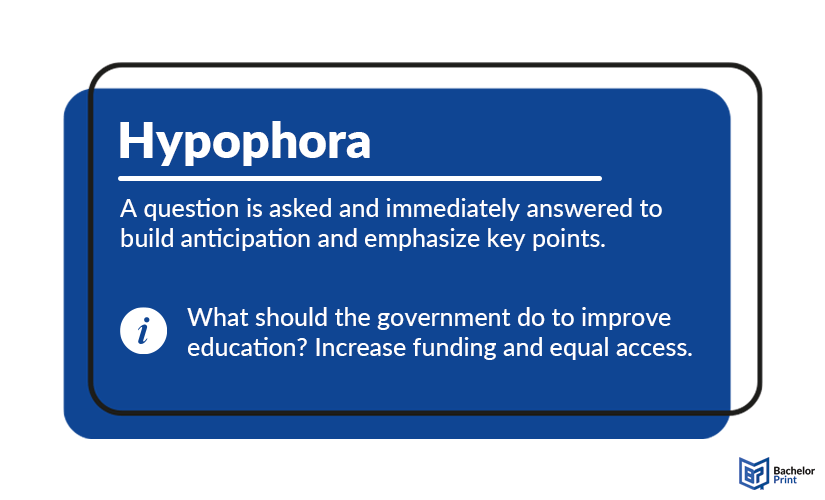
A hypophora, judiciously used in academic writing, can serve as a pivotal rhetorical strategy in both writing and speech, particularly within persuasive contexts. Delving into examples and circumstances in which it is utilized, sheds light on its significance as one of many stylistic devices. By comprehending its use, individuals can significantly improve their writing abilities, gaining a clearer understanding of the sophisticated methods by which writers and speakers convey their messages.
Definition: Hypophora
A hypophora, also referred to as anthypophora, is a rhetorical device where the speaker poses a question and then straight away answers it. The technique is used to engage the audience, guide their thoughts, or emphasize a point. By asking a question, the speaker stimulates the audience’s curiosity or concern, and by providing the answer, they can direct the audience’s focus toward a specific perspective or argument. The answer can be given in multiple ways within a text or dialogue, such as in one simple sentence or in an entire paragraph.
It can be a powerful tool in political speeches, literary works, and persuasive discourse, as it helps to create a dialogue with the audience, even in a monologue format, and can make the information more memorable. To deepen your knowledge of this stylistic device, here are a few examples.

Examples
Below, you’ll find numerous examples of hypophoras in different areas of use.
You can often find this rhetorical device used in daily situations as a sort of reflection, motivation, clarification, and sometimes with a sarcastic undertone to highlight the obviousness of the answer.
In a political debate or speech, these rhetorical devices can control the discussion and guide thoughts in a specific direction before any objections arise.
Here are a few examples of hypophoras in advertisements and marketing.
In literature, an author might use hypophoras to add depth to the narrative or to reveal character insights.
A hypophora in the media is used to prompt the audience to think more intensively about the characters, plot, themes, or moral questions being explored. It’s a way to directly respond to the audience’s potential questions or to articulate the internal conflicts and motivations of characters, enhancing the experience.
In speeches and debates about environmental issues, this stylistic device can help engage the listener by posing relevant questions followed by straightforward questions.
Famous examples
Since the hypophora is a commonly used rhetorical device, there are regular occurrences in public situations. Some famous examples will be shown in the following:
Effects
A hypophora can have various effects, depending on how it is used in speech or writing. Here are some key effects of hypophoras, with an example for each.
Engages the audience
The statement draws in the audience’s attention and encourages them to genuinely think about the answer, making the communication more interactive.
Provides emphasis
It highlights important points, ensuring the audience pays attention to critical aspects of the discussion.
Clarifies complex information
It breaks down complex ideas into more graspable parts, making the subject more accessible to the audience.
Stimulates reflection and critical thinking
It encourages the audience to reflect on their beliefs or understanding of a topic, thus promoting a deeper intellectual engagement and critical thinking.
Advances the argument or narrative
It moves the discussion or story forward by addressing potential questions or concerns the audience might have, keeping the flow of information seamless.
Anthypophora vs. hypophora
The difference between “anthypophora” and “hypophora” can be confusing, as they are both rhetorical devices that focus on the practice of asking a question and then immediately answering it. These days, both terms are often used synonymously, but in its origin the term “hypophora” translates directly to “question,” while “anthypophora” signifies “answer.”
However, with time, “hypophora” has become more commonly used to encompass both aspects when describing the literary device.
Hypophora vs. rhetorical question
It’s a common occurrence for individuals to mix up the concepts of a hypophora and a rhetorical question, not fully grasping the distinct characteristics that set the two apart in the realm of rhetoric and literary devices.
A hypophora answers the question immediately, whereas a rhetorical question does not expect an answer because its purpose is to encourage reflection, highlight a point, or provoke thought. A hypophora is essentially a type of rhetorical question, but not always the other way around.
To further your understanding of the difference, you’ll find numerous examples for each device below.
Academic writing
It’s important to use hypophoras judiciously in research papers or academic essays. The questions being asked need to be relevant to the subject and contribute to the development of the argument or analysis. In academic writing, particularly in the introduction paragraphs of a thesis or dissertation, this tool can be effectively used to engage the readers and set the stage for the research to follow. Here’s an example of how it can be used in this context.
Overusing this device or incorporating questions that are too simplistic might detract from the scholarly tone of the writing. Properly employed, a hypophora can enhance the clarity, persuasiveness, and engagement of an academic text. Below, you’ll find a list of things you should do, and things you shouldn’t do.
Dos
- Use it to enhance: It can highlight key points or preemptively address potential counterarguments.
- Use it to clarify: Use it to break down complex ideas or introduce new sections of your argument.
- Use it to engage: Pose non-limiting questions that might arise in the readers’ minds, which can help maintain their interest.
Don’ts
- Don’t overuse it: Relying too heavily on it can make your writing feel repetitive or overly structured.
- Don’t sacrifice clarity: While it can add stylistic flair to your writing, never let it make your argument harder to follow.
- Don’t use obvious questions: Aim for questions that enhance understanding or provoke thought, instead of questions with self-evident answers.
- ✓ 3D live preview of your individual configuration
- ✓ Free express delivery for every single purchase
- ✓ Top-notch bindings with customised embossing

Tips for effective usage
When incorporating questions into your essay, understanding your audience is crucial. For academic texts that are aimed at a formal or conventional audience, it’s advisable to use questions judiciously, ensuring they fulfil a specific objective. On the contrary, when targeting a more creative or progressive audience, using questions can effectively captivate your readers and stimulate deeper contemplation on your subject. Below, you’ll find a list of helpful sentences you can use.
FAQs
It is a stylistic device that consists of two parts: the first is the question, and the second is the immediate answer to it.
It has numerous effects. This stylistic tool can draw in the reader’s attention, emphasize a point, and clarify complex ideas, to name a few examples.
A direct translation of the word “hypophora” is question, and the word “anthypophora” means answer, however, over time, “hypophora” is used more often to nasty both when referring to the literary device.
Examples
- Why do we look both ways before crossing the street? Because it keeps us safe from oncoming traffic.
- What will it take to solve this mystery? Diligence, intuition, and a bit of luck.
- What did I tell you yesterday? Do your homework, and then you can go outside.
A rhetorical question is a figure of speech where a question is asked for effect or to make a point, rather than to elicit a genuine answer. A hypophora, on the other hand, is a device where a speaker poses a question and then immediately answers it. It is used to engage or introduce a topic by providing an immediate response.
